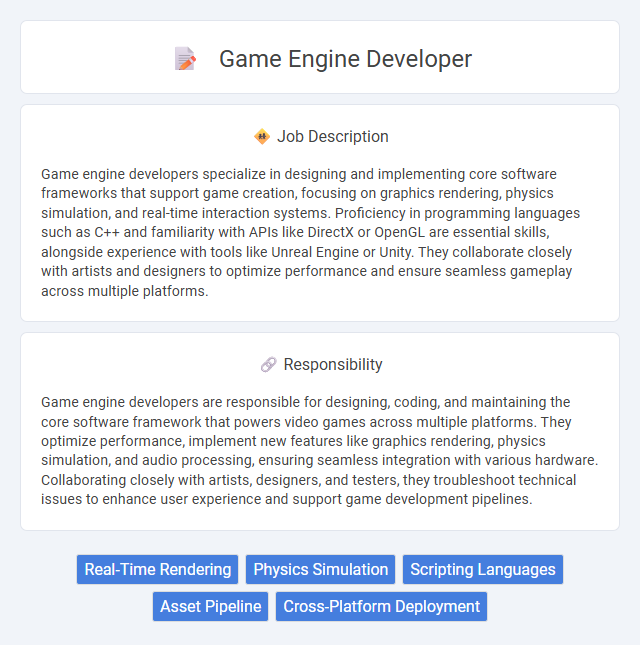
Game engine developers specialize in designing and implementing core software frameworks that support game creation, focusing on graphics rendering, physics simulation, and real-time interaction systems. Proficiency in programming languages such as C++ and familiarity with APIs like DirectX or OpenGL are essential skills, alongside experience with tools like Unreal Engine or Unity. They collaborate closely with artists and designers to optimize performance and ensure seamless gameplay across multiple platforms.
Individuals with strong programming skills and a passion for interactive technology are likely well-suited for a game engine developer role. Those comfortable working in complex problem-solving environments and interested in optimizing graphics and performance may find this job aligns with their strengths. People who prefer collaborative teamwork and continuous learning about emerging technologies might have a higher probability of success in this field.
Qualification
A Game Engine Developer must have strong proficiency in C++ and a deep understanding of computer graphics, physics simulation, and real-time rendering techniques. Experience with software architecture, cross-platform development, and optimization is essential to build efficient and scalable game engines. A background in mathematics, problem-solving skills, and familiarity with APIs such as DirectX or OpenGL significantly enhance a developer's capability in this role.
Responsibility
Game engine developers are responsible for designing, coding, and maintaining the core software framework that powers video games across multiple platforms. They optimize performance, implement new features like graphics rendering, physics simulation, and audio processing, ensuring seamless integration with various hardware. Collaborating closely with artists, designers, and testers, they troubleshoot technical issues to enhance user experience and support game development pipelines.
Benefit
A game engine developer role likely offers competitive compensation and opportunities for skill advancement in cutting-edge technology. There is a good chance of working in a collaborative environment that fosters creativity and innovation. Benefits may include flexible work hours, remote work options, and access to the latest development tools.
Challenge
Game engine developer roles likely involve complex problem-solving challenges, including optimizing rendering performance and ensuring cross-platform compatibility. Mastering low-level programming and real-time systems may be demanding but can lead to innovative breakthroughs in gaming technology. Navigating these technical hurdles probably sharpens analytical skills and fosters continuous learning in a rapidly evolving industry.
Career Advancement
Game engine developers enhance their skills in graphics programming, real-time rendering, and software architecture to advance in their careers. Mastery of programming languages such as C++, Vulkan, and DirectX boosts opportunities for senior roles and leadership positions. Continuous learning in AI integration and cross-platform optimization drives growth in the competitive game development industry.
Key Terms
Real-Time Rendering
Game engine developers specializing in real-time rendering design and optimize graphics pipelines to achieve high-performance visual effects and immersive experiences. They implement advanced shading techniques, manage GPU resources efficiently, and ensure low-latency frame rates for seamless interactive gameplay. Expertise in APIs such as DirectX, Vulkan, and OpenGL, combined with knowledge of graphics algorithms, is critical for developing cutting-edge real-time rendering systems.
Physics Simulation
Game engine developers specializing in physics simulation design and implement complex algorithms that replicate real-world physical behaviors in virtual environments. They optimize collision detection, rigid body dynamics, fluid mechanics, and particle systems to deliver realistic interactions and enhance gameplay immersion. Expertise in C++, mathematics, and physics principles is critical for creating efficient, scalable simulation modules within game engines like Unity or Unreal Engine.
Scripting Languages
Game engine developers specialize in creating and optimizing core systems using scripting languages like Lua, Python, and C#. Proficiency in scripting enhances real-time game mechanics, enabling dynamic content creation and seamless integration with engine components. Mastery of these languages accelerates development workflows and facilitates cross-platform compatibility in modern game engines.
Asset Pipeline
Game engine developers specializing in the asset pipeline design and implement tools that streamline the import, processing, and optimization of game assets such as textures, models, and animations. They ensure seamless integration between asset creation software and the game engine to enhance performance and reduce load times. Proficiency in scripting languages, SDKs, and real-time rendering techniques is essential to maintain efficient workflows and support cross-platform compatibility.
Cross-Platform Deployment
Game engine developers specialize in creating robust systems that enable seamless cross-platform deployment, ensuring games run efficiently on consoles, PCs, and mobile devices. Expertise in APIs such as DirectX, Vulkan, and Metal is essential for optimizing performance across different hardware architectures. Their work significantly reduces development time and costs by enabling code reuse and consistent gameplay experiences across multiple platforms.
 kuljobs.com
kuljobs.com